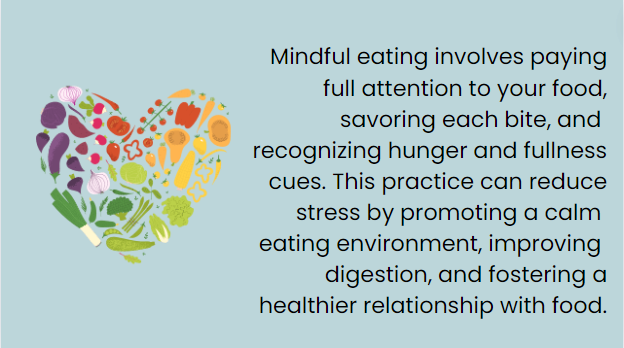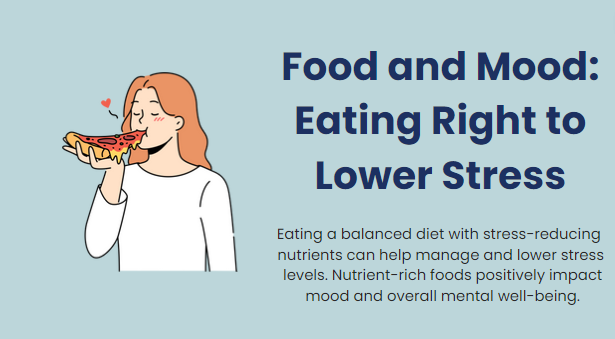In today’s fast-paced world, stress has become an unwelcome companion for many. While we often look to external factors to manage our stress levels, one powerful tool lies right on our plates. The food we consume plays a crucial role in our mental well-being, directly impacting our mood and stress levels. This article explores the intricate relationship between food and mood, offering insights into how eating right can help lower stress and improve overall mental health.
The Science Behind Food and Mood
Our brain and gut are connected through the gut-brain axis, a complex communication system that links emotional and cognitive centers of the brain with peripheral intestinal functions. This connection explains why the food we eat can significantly influence our mental state.
Key points:
- Neurotransmitters like serotonin, often called the “happy hormone,” are produced in the gut
- Certain foods can boost the production of mood-regulating neurotransmitters
- A balanced diet supports overall brain function and emotional regulation
Stress-Busting Nutrients
Several nutrients have been shown to have stress-reducing properties. Incorporating these into your diet can help manage stress levels more effectively.
| Nutrient | Benefits | Food Sources |
|---|---|---|
| Omega-3 fatty acids | Reduce inflammation, support brain health | Fatty fish, walnuts, flaxseeds |
| Magnesium | Regulates neurotransmitters, reduces anxiety | Dark chocolate, avocados, nuts |
| Vitamin C | Lowers cortisol levels, boosts immune system | Citrus fruits, bell peppers, strawberries |
The Power of Complex Carbohydrates
Complex carbohydrates are often overlooked in stress management, but they play a crucial role in mood regulation.
Key points:
- Complex carbs increase serotonin production
- They provide steady energy, preventing mood swings
- Whole grains, vegetables, and legumes are excellent sources

See also>> 7 Simple Ways to Boost Your Mood Every Day
Protein: The Building Blocks of a Calm Mind
Protein-rich foods are essential for maintaining stable mood and energy levels throughout the day.
Key points:
- Proteins contain amino acids necessary for neurotransmitter production
- They help balance blood sugar levels, preventing irritability
- Lean meats, fish, eggs, and plant-based proteins are great options
Hydration and Mood
Staying hydrated is often underestimated in its impact on mood and stress levels.
| Dehydration Level | Potential Mood Effects |
|---|---|
| Mild (1-3%) | Decreased concentration, increased fatigue |
| Moderate (4-6%) | Headaches, irritability, anxiety |
| Severe (>6%) | Confusion, anger, depression |
The Role of Prebiotics and Probiotics
A healthy gut microbiome is crucial for mental well-being. Prebiotics and probiotics support gut health, indirectly influencing mood and stress levels.
Key points:
- Prebiotics feed beneficial gut bacteria
- Probiotics introduce beneficial bacteria to the gut
- Fermented foods, yogurt, and fiber-rich vegetables support gut health
Foods to Avoid for Better Mood
While some foods can help reduce stress, others can exacerbate it. Being mindful of these foods can make a significant difference in managing stress levels.
Foods to limit or avoid:
- Processed foods high in sugar and unhealthy fats
- Excessive caffeine
- Alcohol
- Artificial sweeteners
See also>> How to Make Healthy Eating Easy on a Busy Schedule
Creating a Stress-Reducing Meal Plan
Incorporating stress-reducing foods into your daily diet doesn’t have to be complicated. Here’s a simple guide to get you started:
| Meal | Stress-Reducing Options |
|---|---|
| Breakfast | Oatmeal with berries and nuts |
| Lunch | Grilled chicken salad with avocado |
| Dinner | Salmon with quinoa and roasted vegetables |
| Snacks | Greek yogurt with honey, dark chocolate |
Mindful Eating for Stress Reduction
How we eat is just as important as what we eat when it comes to managing stress.
Key points:
- Practice mindful eating by focusing on your food without distractions
- Chew slowly and savor each bite
- Listen to your body’s hunger and fullness cues

The Impact of Meal Timing on Mood
Regular meal times can help stabilize blood sugar levels and improve mood throughout the day.
Key points:
- Aim for consistent meal times
- Don’t skip meals, especially breakfast
- Consider smaller, more frequent meals if it suits your lifestyle
Supplements for Stress Management
While a balanced diet should be the primary focus, certain supplements can support stress reduction.
Key points:
- Consult with a healthcare professional before starting any supplement regimen
- Common stress-reducing supplements include ashwagandha, rhodiola, and B-complex vitamins
- Remember, supplements are not a substitute for a healthy diet
See also>> Understanding Anxiety: Tips to Feel Better
FAQs
Q: How quickly can dietary changes impact mood?
A: Some people report feeling better within a few days of making dietary changes, but it typically takes a few weeks to notice significant improvements in mood and stress levels.
Q: Can certain foods cause stress?
A: Yes, foods high in sugar, unhealthy fats, and excessive caffeine can contribute to increased stress and anxiety levels.
Q: Is it necessary to completely eliminate comfort foods to manage stress?
A: Not necessarily. Moderation is key. Occasional indulgence in comfort foods is fine, but focus on building a diet primarily composed of nutrient-rich, stress-reducing foods.
Q: How does sugar affect stress levels?
A: Consuming high amounts of sugar can lead to rapid spikes and crashes in blood sugar levels, which can increase feelings of anxiety and irritability.
Q: Are there specific diets that are particularly good for stress management?
A: Mediterranean and plant-based diets are often recommended for stress management due to their emphasis on whole foods, healthy fats, and complex carbohydrates.
conclusion:
The food we eat greatly affects our mental well-being and stress levels. Adding nutrient-rich, stress-reducing foods and practicing mindful eating can boost mood and resilience. For optimal results, combine dietary changes with regular exercise, sufficient sleep, and stress-reduction techniques like meditation. If stress persists, seek professional help.
